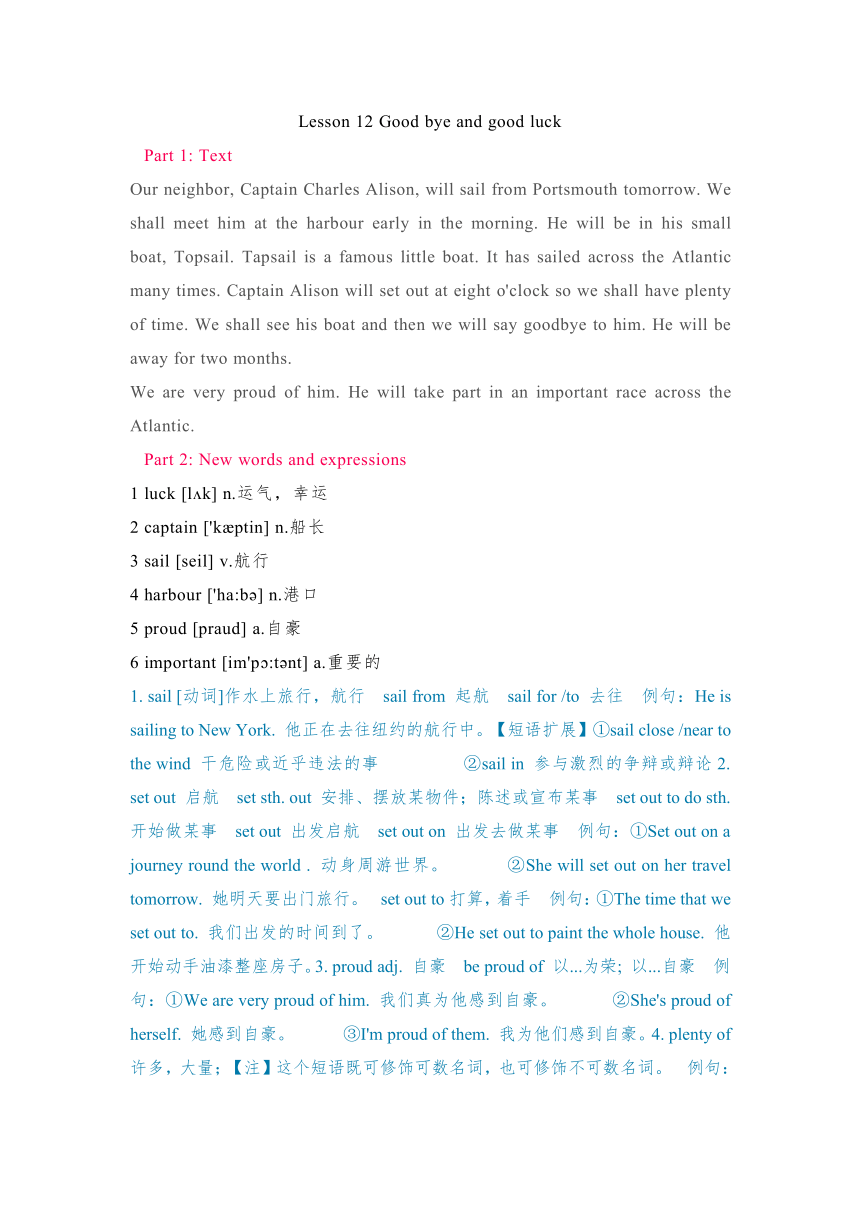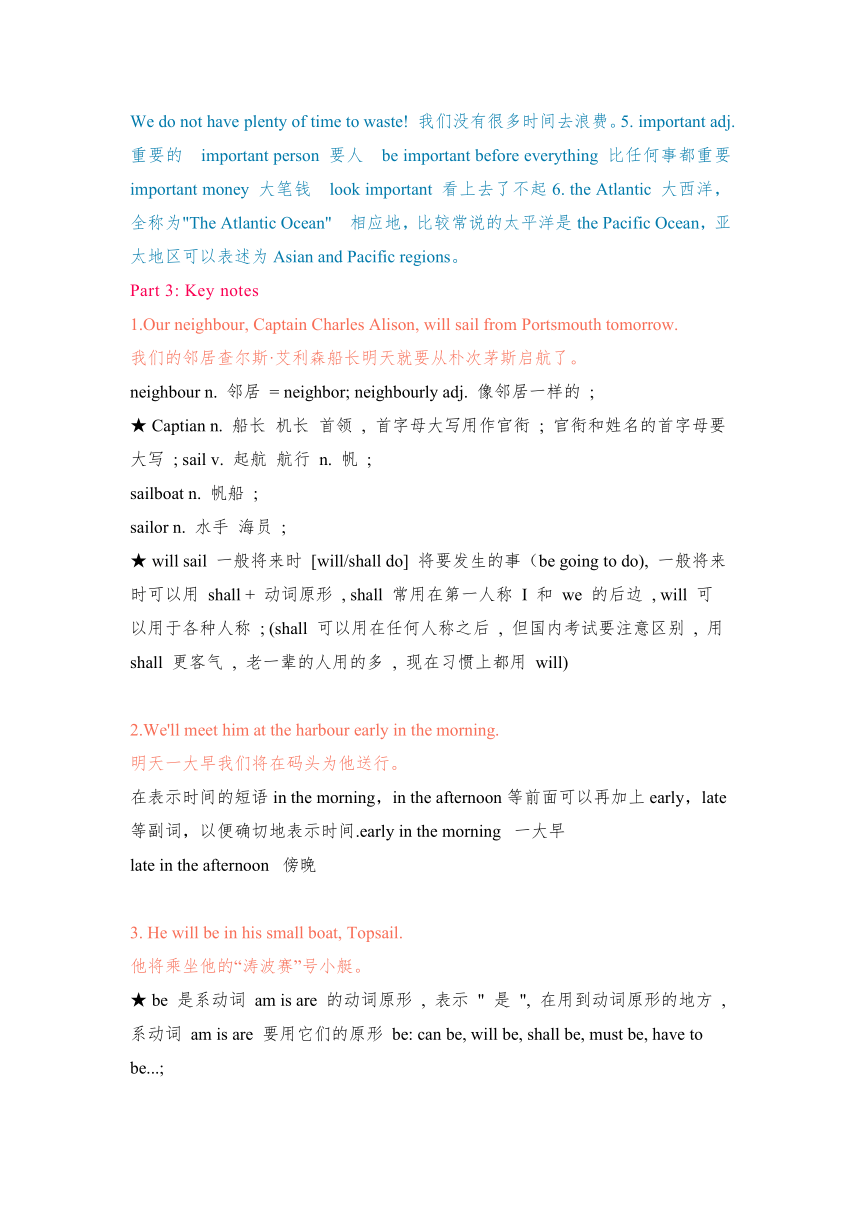新概念英语第二册 Lesson 12 Good bye and good luck 讲义
文档属性
| 名称 | 新概念英语第二册 Lesson 12 Good bye and good luck 讲义 |  | |
| 格式 | docx | ||
| 文件大小 | 21.9KB | ||
| 资源类型 | 教案 | ||
| 版本资源 | 新概念英语 | ||
| 科目 | 英语 | ||
| 更新时间 | 2023-09-26 16:59:54 | ||
图片预览


文档简介
Lesson 12 Good bye and good luck
Part 1: Text
Our neighbor, Captain Charles Alison, will sail from Portsmouth tomorrow. We shall meet him at the harbour early in the morning. He will be in his small boat, Topsail. Tapsail is a famous little boat. It has sailed across the Atlantic many times. Captain Alison will set out at eight o'clock so we shall have plenty of time. We shall see his boat and then we will say goodbye to him. He will be away for two months.
We are very proud of him. He will take part in an important race across the Atlantic.
Part 2: New words and expressions
1 luck [l k] n.运气,幸运
2 captain ['k ptin] n.船长
3 sail [seil] v.航行
4 harbour ['ha:b ] n.港口
5 proud [praud] a.自豪
6 important [im'p :t nt] a.重要的
1. sail [动词]作水上旅行,航行 sail from 起航 sail for /to 去往 例句:He is sailing to New York. 他正在去往纽约的航行中。【短语扩展】①sail close /near to the wind 干危险或近乎违法的事 ②sail in 参与激烈的争辩或辩论2. set out 启航 set sth. out 安排、摆放某物件;陈述或宣布某事 set out to do sth. 开始做某事 set out 出发启航 set out on 出发去做某事 例句:①Set out on a journey round the world . 动身周游世界。 ②She will set out on her travel tomorrow. 她明天要出门旅行。 set out to打算,着手 例句:①The time that we set out to. 我们出发的时间到了。 ②He set out to paint the whole house. 他开始动手油漆整座房子。3. proud adj. 自豪 be proud of 以...为荣; 以...自豪 例句:①We are very proud of him. 我们真为他感到自豪。 ②She's proud of herself. 她感到自豪。 ③I'm proud of them. 我为他们感到自豪。4. plenty of 许多,大量;【注】这个短语既可修饰可数名词,也可修饰不可数名词。 例句:We do not have plenty of time to waste! 我们没有很多时间去浪费。5. important adj. 重要的 important person 要人 be important before everything 比任何事都重要 important money 大笔钱 look important 看上去了不起6. the Atlantic 大西洋,全称为"The Atlantic Ocean" 相应地,比较常说的太平洋是the Pacific Ocean,亚太地区可以表述为Asian and Pacific regions。
Part 3: Key notes
1.Our neighbour, Captain Charles Alison, will sail from Portsmouth tomorrow.
我们的邻居查尔斯·艾利森船长明天就要从朴次茅斯启航了。
neighbour n. 邻居 = neighbor; neighbourly adj. 像邻居一样的 ;
★ Captian n. 船长 机长 首领 , 首字母大写用作官衔 ; 官衔和姓名的首字母要大写 ; sail v. 起航 航行 n. 帆 ;
sailboat n. 帆船 ;
sailor n. 水手 海员 ;
★ will sail 一般将来时 [will/shall do] 将要发生的事(be going to do), 一般将来时可以用 shall + 动词原形 , shall 常用在第一人称 I 和 we 的后边 , will 可以用于各种人称 ; (shall 可以用在任何人称之后 , 但国内考试要注意区别 , 用 shall 更客气 , 老一辈的人用的多 , 现在习惯上都用 will)
2.We'll meet him at the harbour early in the morning.
明天一大早我们将在码头为他送行。
在表示时间的短语in the morning,in the afternoon等前面可以再加上early,late等副词,以便确切地表示时间.early in the morning 一大早
late in the afternoon 傍晚
3. He will be in his small boat, Topsail.
他将乘坐他的“涛波赛”号小艇。
★ be 是系动词 am is are 的动词原形 , 表示 " 是 ", 在用到动词原形的地方 , 系动词 am is are 要用它们的原形 be: can be, will be, shall be, must be, have to be...;
4.It has sailed across the Atlantic many times.
它已经多次横渡大西洋。
across是对某个细长物“横切、横断、横渡”等,尤指河流、马路、海洋等;过桥用over
the Atlantic =the Atlantic Ocean 大西洋
once,twice,three times…
表示次数的时候, for 一定不能加
I do something twice.
5.Captain Alison will set out at eight o'clock, so we'll have plenty of time.
艾利森船长将于 8 点钟启航,因此我们有充裕的时间。
set out/set off/begin something 出发,动身
plenty =enough 相对多,充足的,足够的
plenty of 足够多的……
I have plenty of money. a lot of 指客观上的多
6.We'll see his boat and then we'll say goodbye to him.
我们将参观他的船,然后和他告别。
see = visit 参观 Can I see it
say goodbye (to sb.);say hello to (to sb.);say sorry to (to sb.)
7.He will be away for two months.
他要离开两个月。
瞬间动词不是不能用完成时态, 而是指不能与段时间连用, 一旦要用段时间就要将其变为 “系表结构” 即 “be + 形容词或介词短语构成”
He has been away for two hours.
=He left two hours ago.点时间
有的动词可用be+形容词系表结构表状态来代替
arrive= be here/there ;leave= be away ;die = be dead ;join(也是瞬间动词) = be a soldier/in the army
8.He will take part in an important race across the Atlantic.
他将参加一次重大的横渡大西洋的比赛。
take part (in) 参加,参与(某项活动)
enter for 报名参加
I have entered for the meeting,but now I don't want to take part in the meeting.
an important race across the Atlantic 横渡大西洋的比赛(介词短语做定语放在被修饰词的后面)
the person at the door
be in the race = take part in the race 参加比赛
at the race 在比赛场地观看比赛
Part 4: Grammar
一般将来时
一般将来时由will(第1人称时可用shall)加动词原形构成,可用来预言将来发生的事,如说出我们设想会发生的事或者请对方预言将要发生什么事。will可用于所有人称。当You and I为主语时,通常避免用shall:
You and I will work in the same office.
你和我将在同一个办公室工作。
will在书面语和流利的口语中,在元音之后可以缩略为-'ll,如I'll, we'll, you'll等:
We'll be back at five o'clock.
我们5点钟回来。
-'ll在下列场合也可用于辅音之后:
人名之后:
Tom'll be here soon.
汤姆马上就来这儿。
疑问词之后:
When'll Mary be back
玛丽什么时候回来
普通名词之后:
The concert'll start in a minute.
音乐会一会儿就要开始了。
That film'll be on next Sunday.
那部影片下星期天上映。
在否定式中,will not可以缩略为-'ll not或 won't; shall not缩略为shan't(在美国英语中很少用shan't, 用shall表示将来也不常用):
I/ we won't/ shan't go.
我/我们不会去。
Won't you have some cake
你不吃点蛋糕吗
Part 5: Homework
1.背诵lesson 12课文
2.会读Lesson 12单词 并结合课文记忆
3.完成Lesson 12 配套练习
Part 1: Text
Our neighbor, Captain Charles Alison, will sail from Portsmouth tomorrow. We shall meet him at the harbour early in the morning. He will be in his small boat, Topsail. Tapsail is a famous little boat. It has sailed across the Atlantic many times. Captain Alison will set out at eight o'clock so we shall have plenty of time. We shall see his boat and then we will say goodbye to him. He will be away for two months.
We are very proud of him. He will take part in an important race across the Atlantic.
Part 2: New words and expressions
1 luck [l k] n.运气,幸运
2 captain ['k ptin] n.船长
3 sail [seil] v.航行
4 harbour ['ha:b ] n.港口
5 proud [praud] a.自豪
6 important [im'p :t nt] a.重要的
1. sail [动词]作水上旅行,航行 sail from 起航 sail for /to 去往 例句:He is sailing to New York. 他正在去往纽约的航行中。【短语扩展】①sail close /near to the wind 干危险或近乎违法的事 ②sail in 参与激烈的争辩或辩论2. set out 启航 set sth. out 安排、摆放某物件;陈述或宣布某事 set out to do sth. 开始做某事 set out 出发启航 set out on 出发去做某事 例句:①Set out on a journey round the world . 动身周游世界。 ②She will set out on her travel tomorrow. 她明天要出门旅行。 set out to打算,着手 例句:①The time that we set out to. 我们出发的时间到了。 ②He set out to paint the whole house. 他开始动手油漆整座房子。3. proud adj. 自豪 be proud of 以...为荣; 以...自豪 例句:①We are very proud of him. 我们真为他感到自豪。 ②She's proud of herself. 她感到自豪。 ③I'm proud of them. 我为他们感到自豪。4. plenty of 许多,大量;【注】这个短语既可修饰可数名词,也可修饰不可数名词。 例句:We do not have plenty of time to waste! 我们没有很多时间去浪费。5. important adj. 重要的 important person 要人 be important before everything 比任何事都重要 important money 大笔钱 look important 看上去了不起6. the Atlantic 大西洋,全称为"The Atlantic Ocean" 相应地,比较常说的太平洋是the Pacific Ocean,亚太地区可以表述为Asian and Pacific regions。
Part 3: Key notes
1.Our neighbour, Captain Charles Alison, will sail from Portsmouth tomorrow.
我们的邻居查尔斯·艾利森船长明天就要从朴次茅斯启航了。
neighbour n. 邻居 = neighbor; neighbourly adj. 像邻居一样的 ;
★ Captian n. 船长 机长 首领 , 首字母大写用作官衔 ; 官衔和姓名的首字母要大写 ; sail v. 起航 航行 n. 帆 ;
sailboat n. 帆船 ;
sailor n. 水手 海员 ;
★ will sail 一般将来时 [will/shall do] 将要发生的事(be going to do), 一般将来时可以用 shall + 动词原形 , shall 常用在第一人称 I 和 we 的后边 , will 可以用于各种人称 ; (shall 可以用在任何人称之后 , 但国内考试要注意区别 , 用 shall 更客气 , 老一辈的人用的多 , 现在习惯上都用 will)
2.We'll meet him at the harbour early in the morning.
明天一大早我们将在码头为他送行。
在表示时间的短语in the morning,in the afternoon等前面可以再加上early,late等副词,以便确切地表示时间.early in the morning 一大早
late in the afternoon 傍晚
3. He will be in his small boat, Topsail.
他将乘坐他的“涛波赛”号小艇。
★ be 是系动词 am is are 的动词原形 , 表示 " 是 ", 在用到动词原形的地方 , 系动词 am is are 要用它们的原形 be: can be, will be, shall be, must be, have to be...;
4.It has sailed across the Atlantic many times.
它已经多次横渡大西洋。
across是对某个细长物“横切、横断、横渡”等,尤指河流、马路、海洋等;过桥用over
the Atlantic =the Atlantic Ocean 大西洋
once,twice,three times…
表示次数的时候, for 一定不能加
I do something twice.
5.Captain Alison will set out at eight o'clock, so we'll have plenty of time.
艾利森船长将于 8 点钟启航,因此我们有充裕的时间。
set out/set off/begin something 出发,动身
plenty =enough 相对多,充足的,足够的
plenty of 足够多的……
I have plenty of money. a lot of 指客观上的多
6.We'll see his boat and then we'll say goodbye to him.
我们将参观他的船,然后和他告别。
see = visit 参观 Can I see it
say goodbye (to sb.);say hello to (to sb.);say sorry to (to sb.)
7.He will be away for two months.
他要离开两个月。
瞬间动词不是不能用完成时态, 而是指不能与段时间连用, 一旦要用段时间就要将其变为 “系表结构” 即 “be + 形容词或介词短语构成”
He has been away for two hours.
=He left two hours ago.点时间
有的动词可用be+形容词系表结构表状态来代替
arrive= be here/there ;leave= be away ;die = be dead ;join(也是瞬间动词) = be a soldier/in the army
8.He will take part in an important race across the Atlantic.
他将参加一次重大的横渡大西洋的比赛。
take part (in) 参加,参与(某项活动)
enter for 报名参加
I have entered for the meeting,but now I don't want to take part in the meeting.
an important race across the Atlantic 横渡大西洋的比赛(介词短语做定语放在被修饰词的后面)
the person at the door
be in the race = take part in the race 参加比赛
at the race 在比赛场地观看比赛
Part 4: Grammar
一般将来时
一般将来时由will(第1人称时可用shall)加动词原形构成,可用来预言将来发生的事,如说出我们设想会发生的事或者请对方预言将要发生什么事。will可用于所有人称。当You and I为主语时,通常避免用shall:
You and I will work in the same office.
你和我将在同一个办公室工作。
will在书面语和流利的口语中,在元音之后可以缩略为-'ll,如I'll, we'll, you'll等:
We'll be back at five o'clock.
我们5点钟回来。
-'ll在下列场合也可用于辅音之后:
人名之后:
Tom'll be here soon.
汤姆马上就来这儿。
疑问词之后:
When'll Mary be back
玛丽什么时候回来
普通名词之后:
The concert'll start in a minute.
音乐会一会儿就要开始了。
That film'll be on next Sunday.
那部影片下星期天上映。
在否定式中,will not可以缩略为-'ll not或 won't; shall not缩略为shan't(在美国英语中很少用shan't, 用shall表示将来也不常用):
I/ we won't/ shan't go.
我/我们不会去。
Won't you have some cake
你不吃点蛋糕吗
Part 5: Homework
1.背诵lesson 12课文
2.会读Lesson 12单词 并结合课文记忆
3.完成Lesson 12 配套练习
同课章节目录
